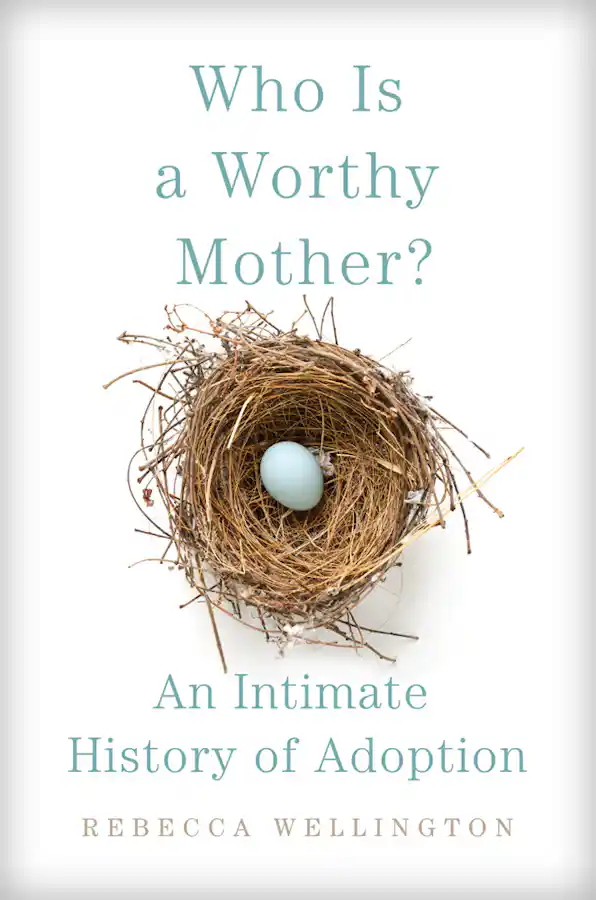

Rebecca Wellington is a Clinical Instructor and Director of Field Placements in the School of Education at the University of Puget Sound. This interview is based on her new book, Who Is a Worthy Mother?: An Intimate History of Adoption (University of Oklahoma Press, 2024).
JF: What led you to write Who Is a Worthy Mother?
RW: When I started graduate school in 2010, working on my doctorate in Education History, I imagined that my doctoral research would culminate in my first book. Who Is a Worthy Mother? was not in my plans. But at the end of my doctoral program this book fell into my world like an anvil. The summer of 2017, when I finished my doctorate, my sister died of a drug overdose. Like me she was adopted. Unlike me she relinquished a child for adoption. Her death rocked my world and put on hold everything that I thought was next up for me professionally. I began researching ways that I could get access to my original birth records and connect with my birth family….and every door shut in my face. My next step was to read everything I could get my hands on about the history of adoption policy in America, largely to understand why it was so challenging for me to simply access my original birth certificate. I was shocked and horrified by this history. And I was even more astounded and infuriated, that I hadn’t been aware of this history and this history seemed lost to our collective awareness as a nation. As a historian, educator, mother and adoptee I wanted to change that.
JF: In 2 sentences, what is the argument of Who Is a Worthy Mother?
RW: The historical foundation of adoption in the United States is defined by abusive practices that expose our culture’s continuing deep distrust of women, particularly poor women and women of color, and the paradoxical threat and power women’s fertility pose to hegemonic societal norms. Millions of women in this country have been told that they may not keep their babies, or have been forcibly sterilized so that they do not have more children; they have been told that they are unworthy of being mothers. At the same time, women repeatedly hear the message that they are unworthy if they choose not to be mothers or cannot have babies. American women live within the tension of this paradox, which allows only a small window of acceptable motherhood, acceptable womanhood.
JF: Why do we need to read Who Is a Worthy Mother?
RW: History has incredible power. It can paint pictures of where we came from and how the world and people in it looked, acted, and believed. This is weighty because how we understand ourselves and the world around us in this current moment is largely defined and shaped by what happened in the past. This is the power of historical narratives and historical memory. When people’s lives in the past are silenced, this, in turn, silences people’s lives in the present. But when these stories are told, it changes our understanding of the present world. When people’s stories are shared, especially the lives of people who are deliberately traumatized and silenced, those awoken historical narratives directly affect the lives of people in the present. We start to view the world and our place in it differently, and then we actually start to act differently. And this, in turn, impacts the future. Our nation has a detrimental amnesia of adoption history and policy. Already, two years after the passage of the Dobbs decision, we are cycling back to policies and practices around adoption and fertility that are massively destructive to women, children and families. We need to understand the impact of our past practices to move forward at this prescient moment in ways that lift up American women, children and families who are especially vulnerable to abusive policies.
*Also, to date this is the first history of adoption written by a historian who is also adopted. That positionality matters.
JF: Why and when did you become an American historian?
RW: I have always been fascinated by history. It was my favorite subject in school. But I really became aware of the power of history when I was teaching high school social studies in the early 2000’s. That is when I really began to realize the impact historical awareness can have on future generations. After teaching high school I pursued my doctorate in Education History, marrying my two passions. I now teach in a Master in Teaching program, working with pre-service k-12 teachers.
JF: What is your next project?
RW: I have a book under contract with the University of Oregon Press called Breaking Boundaries: Activism and Acculturation at Chemawa Indian School. This research comes out of my doctoral dissertation and has a projected completion date of fall, 2026.
JF: Thanks, Rebecca!